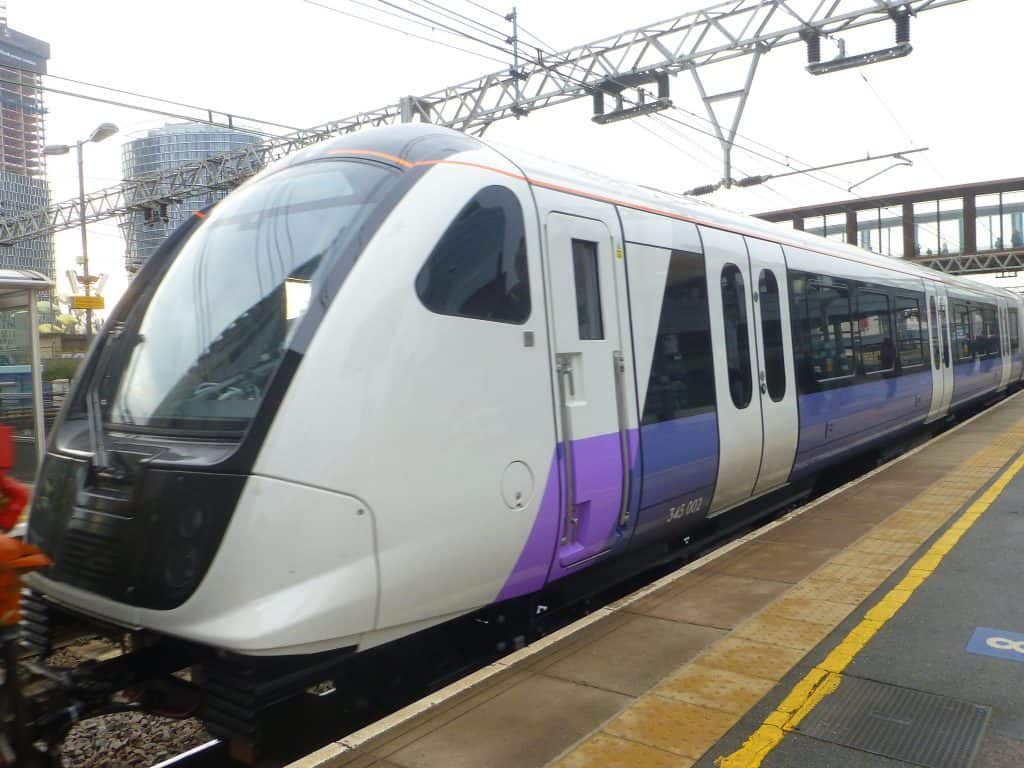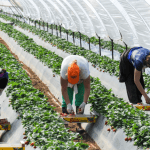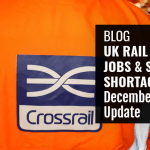UK Rail Jobs – Where Are The Opportunities In 2018?
The UK Rail sector* contributes £36bn to the UK economy annually, contributing more than food, drink and tobacco manufacturing and the chemical and pharmaceutical industries. £11.1bn is contributed by the railway system itself and £25.1bn ( 69%) by the production of other goods and services supported by rail-related demand. The UK Rail sector employs 240,000 people directly in UK rail jobs, however the wider UK rail network supports around 597,000 jobs (including metro services and catering and retail at stations), c.1.7% of total UK jobs.

UK Rail Jobs – Employment Breakdown
- Total employment – 597,4000
- UK railway system -114,500 staff /19% of all UK rail jobs, but has the highest GVA per job at £98,500
- Catering and other services – 96,500 /16.2% of all UK rail jobs
- Retail and wholesale – 73,300 /12.3% of all UK rail jobs
- Other transport service s- 71,300 / 11.8% of all UK rail jobs
- Professional & financial services – 66,200 /11.1% of all UK rail jobs
- Business support services – 66,200 /11% of all UK rail jobs
- Other goods & repair of machinery – 47,100 / 7.8% of all UK rail jobs
- Construction – 29,900 / 5% of all UK rail jobs
- Information & communication – 22,000 / 3.7% of all UK rail jobs
- Transport equipment manufacturing 10,100 / 1.7% of all UK rail jobs
Also, the total GVA of rail-related industries was third highest behind telecommunications, electricity & gas supply and higher than that of UK-wide food, drink and tobacco manufacturing sector.
UK Rail Jobs – Opportunities 2018
- Derby – A £200m 79-day railway track and signalling engineering upgrade project by Network Rail and industry partners CrossCountry and East Midlands Trains will start on 22 July 2018
- Toton – a planned HS2 station at Toton could open several years ahead of schedule and before the arrival of HS2 Phase 2b in 2033. East Midlands Hub, located on existing railway land between Nottingham and Derby, would open to classic services during the 2020s. New road infrastructure and the construction of an adjacent ‘innovation campus’ and Garden Village housing development would also be brought forward.
- East Midlands Gateway – located next to the M1 and East Midlands Airport – the UK’s second-largest cargo airport – has planning consent for up to six million sq ft of logistics space and will incorporate a 50-acre strategic rail freight interchange. Named SEGRO Logistics Park East Midlands Gateway, the development will directly create 7,250 jobs, alongside 900 construction roles and 3,000 indirect jobs with Nestle, Amazon and Shop Direct (Littlewoods and Very) already signing up
- Goole Yorkshire – In March 2018 Siemens announced plans to build a £200m factory plan which could pose a threat to jobs at Derby train-maker Bombardier’s factory. Siemens’ new facility, which would manufacture trains for UK operators, would create 1700 jobs, but would only start if the company secures “major future orders” e.g. if its lands multi-billion pound rolling stock orders for either HS2 or London Underground. Construction work could begin as early as this year. The new factory is set to employ up to 700 people in skilled engineering and manufacturing roles, plus an additional 250 people during the construction phase, with an estimated 1, 700 indirect jobs could be created throughout the UK supply chain. The factory will include manufacturing and commissioning buildings, warehouses, offices, and stabling sidings with potential for the development of a test track
- Doncaster – dubbed ‘Aerotrpolis’, a £170m project to build a railway station at Doncaster Robin Hood Airport would create 73,000 jobs for the region, including 3000 new homes, shopping, hotel & leisure facilities is still in the conceptual stages, but could be delivered within 5 years
- Doncaster – A new railway depot at Doncaster Carr to maintain a fleet of services by Hitachi Rail Europe recently created 250 jobs
- Crossrail (1) – Crossrail (1) has been under construction since 2009 and expected to create 55,000 jobs in total and generate £42 billion to the UK economy. It is Europe’s largest infrastructure project at a cost of £14.8bn and 90% complete. Crossrail trains are already in operation between Liverpool Street Main Line and Shenfield Essex. In May 2018 a rail service is to open between Paddington and Heathrow. In December 2018 the Elizabeth line will open between Paddington and Abbey Wood, Liverpool Street to Shenfield, Paddington Main Line to Heathrow Terminal 4. In May 2019 direct services will operate Paddington to Shenfield and Paddington to Abbey Wood. In December 2019 the Elizabeth line will open fully, with services running from Reading and Heathrow in the west to Shenfield and Abbey Wood in the east
- Crossrail (2) – A proposed new regional railway, would support 60,000 new jobs across the UK supply chain while under construction and 200,000 jobs across London and the South East once operational. An Independent Affordability Review into Crossrail 2, commissioned jointly by the Department for Transport and Transport for London is due for completion by end of summer 2018
- HS2 – HS2 (High Speed 2) is a planned high-speed railway linking London, Birmingham, the East Midlands, Leeds and Manchester and Scotland. Major work on clearing the route, bridges and tunnels in Phase one (London to Birmingham) will start mid-2018. First trains are expected to run in 2026. Phase two, which will link Birmingham with Manchester and Leeds should be up and running in 2032/33.The full network is expected to be completed in 2033. In total, construction of the full HS2 route to the north-west and Yorkshire will create up to 25,000 jobs and 2,000 apprenticeships. Another 3,000 people will operate HS2 and it is estimated that growth around new HS2 stations will create another 100,000 jobs.
- HS2 Birmingham – In February 2018 Arup and WSP were among the teams of architects, designers and engineers contractors appointed to design the 2 new HS2 stations in Birmingham, Birmingham Curzon Street and Interchange which are expected to open in 2026. HS2 is expected to create 50,000 jobs in Birmingham and Solihull alone. As well as the new stations, there will be a huge investment in civil engineering work as the high-speed line is constructed, while an extensive programme of preparatory works, ranging from archaeology investigations to nature conservation is already underway. The process to decide who will build the stations will begin later in 2018 and conclude in 2019. The delivery of the two stations will require a vast supply chain, creating thousands of sub-contract opportunities and jobs, the majority of which will be construction related
- HS2 Manchester – HS2 is set to arrive in Greater Manchester by 2026 with full operations in place by 2033 with new integrated stations at Manchester Airport and Piccadilly linking HS2 and Northern Powerhouse Rail, create 40,000 new jobs over the next ten years
- HS2 Crewe – it is anticipated hoped construction work will start in 2022/2023
- HS2 East Midlands – HS2 is expected to help deliver an additional 74,000 jobs by 2043 in the Derby, Nottingham, Nottinghamshire and Derbyshire region. The East Midlands could receive up to £100m of government funding which would support the two HS2 stations proposed for Derbyshire and Nottinghamshire. In summer 2017, the Government confirmed its preferred route for HS2’s ‘Phase 2b’ line, part of which will travel through Derbyshire. The line includes plans for a HS2 maintenance depot at Staveley and provision for HS2 compatible trains serving the current Chesterfield train station.
- HS3 – North of England – Transport for the North (TfN) has proposed investment of £60-£70bn between 2020 and 2050 in a new train line, Northern Powerhouse Rail, dubbed ‘HS3’ – a fast line between Bradford, Leeds, Manchester and Liverpool which could create 850,000 jobs. Suggestions it should be called HS3 or Crossrail for the North and should connect with HS2 from Sheffield in the east and Crewe in the west
- Tunstall – 25 jobs will be created if plans for a new rail freight terminal go ahead. Land Recovery Ltd wants to build an interchange as part of an expanded aggregate recycling facility on the Ravensdale site in Tunstall, allowing materials and containers to be transferred to heavy goods vehicles from freight trains, which would access the site via the West Coast Mainline
- Leicestershire – plans for a major new rail freight depot (between the motorway and the Leicester to Hinckley railway line to the south of Elmesthorpe village) could create 8,400 jobs
- Inverness – A manager at north transport partnership Hitrans, Frank Roach has called for a rail and bus interchange to be created in Inverness after the Royal Mail announced plans to relocate its Highland sorting office to another city site.The £6.6m investment in a new facility on Seafield Road will free up the existing premises in Strothers Lane. The existing 274 workers there will keep their jobs when they transfer to the bigger facility with the possibility of new jobs. Work is also due to start summer 2018 on the £6m revamp of Inverness train station and Station Square
- Motherwell – Plans to create an improved transport interchange at Motherwell’s railway station were given the go-ahead in April 2018 creating jobs
- Glasgow – A £100m redevelopment of Glasgow Queen Street station will be completed by 2020 creating new jobs and is part of a £742m upgrade to boost rail infrastructure between Glasgow and Edinburgh
- West Midlands – Network Rail is taking on 150 apprentices in Coventry on a three-year training programme
- Newport Wales – Spanish train maker Construcciones y Auxiliar de Ferrocarriles (CAF) has been building a £3om 15,000 sq metre factory in Newport which is expected to employ 300 people when production starts in autumn 2018
- Guilford – A £150m redevelopment of Guildford station is planned and upgrade of Clapham junction
- Leeds – 3,000 new jobs are on track for the UK’s first dedicated hub for high-speed rail technologies set to be built in Leeds which will be a centre of excellence for high speed rail planning, design, construction and manufacturing
- Newcastle – A multi-billion pound plan for new trains, better services and revamped stations could see a near 5,500 jobs boost in Newcastle in the next five years
- Eastleigh – 100 jobs are to be created at Eastleigh Rail Works following a multi-million-pound investment by Network Rail. Siemens won a multi-million-pound contract from Network Rail to upgrade the UK’s fleet of freight trains to make them safer and more adaptable. Work will start in 2022. It follows a contract between SWR and Siemens to refurbish its fleet of trains at Eastleigh Works in 2017, creating 200 new jobs
We Are Rail & Transportation Recruitment Experts
Over the past 10 years, our team of rail recruitment experts has had a hugely successful and proven track record. Ten Live have recruited across the Rail and Transportation sectors in the UK and Middle East ( UAE, Qatar, Bahrain, Kuwait and the Kingdom of Saudi Arabia).
We are specialists in placing expertise within Rail/Metro work streams. Ten Live acquire top talent from the global pool, sourcing the highest quality UK and international candidates.
We pride ourselves on providing our Rail & Transportation clients with a personalised, tailored service supplying professional, reliable, permanent and contract resource :
- Rail & transportation recruitment – Search & Selection
- Contingency Recruitment
- Recruitment Consultancy
- Resource Management
- HR Consultancy and Retention
- RPO
- Bids & Tender support
- Contract Management
Looking for skilled, experienced & reliable
contract, temporary or permanent staff for your rail project?
Get in touch with Ten Live !
Contact
Tel: + 44 (0) 1236 702 007
Email: info@tenlivegroup.com

Note: UK Rail sector here comprises three industry groups: the railway system, comprising passenger and freight train operators and infrastructure providers; the rail supply sector, comprising SMEs and larger companies in the multiproduct supply chains of UK and overseas rail networks; and retailers and caterers operating at UK railway stations, and their domestic supply chain.
SOURCES
Derbyshire Economic Partnership











